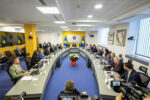Albanian National Council Condemns Discriminatory Actions
The President of the Albanian National Council (KKSH), Enkel Rexhepi, has accused Serbia of intensifying its attacks against Albanians in the Presevo Valley, citing open discrimination and political repression against Albanian institutions.
In a statement on Facebook, Rexhepi denounced the Serbian government’s refusal to register the newly elected KKSH president as part of a broader campaign against the council.
“The Albanian National Council considers the decision of Serbia’s Ministry for Human Rights and Social Dialogue an openly hostile act aimed at blocking economic assistance and dismantling the institutional autonomy of Albanians in Serbia,” the statement reads.
Systematic Moves Against the Albanian National Council
According to the council, Serbia has undertaken two consecutive actions that amount to a direct assault on the institution:
- Revocation of subsidies for Albanian farmers – The ministry annulled a decision enabling financial aid from the Kosovo government to support local farmers.
- Blocking the registration of the new KKSH president – The ministry rejected the registration of Enkel Rexhepi, citing bureaucratic technicalities.
These actions are seen as clear examples of Serbia’s discriminatory policies against Albanians, who continue to face political repression, economic marginalization, and exclusion from institutional decision-making.
Economic Blockade of Albanians in the Presevo Valley
On January 27, 2025, Serbia’s Ministry for Human Rights and Social Dialogue invalidated a KKSH decision that allowed public funding for Albanian farmers, financed by Kosovo’s government. The council argues that this move lacks legal justification and is politically motivated, aiming to isolate Albanians and deny them access to international aid.
“There is no legal provision prohibiting the acceptance of lawful funds or donations, particularly when they serve development purposes,” KKSH stated. “Kosovo’s aid is intended to improve livelihoods in agriculture, a sector completely neglected by the Serbian state.”
The council condemns this decision as a deliberate economic blockade, reinforcing Serbia’s long-standing policy of preventing the Presevo Valley’s development while offering no alternative assistance.
Undermining Institutional Autonomy
On January 28, 2025, the ministry further escalated tensions by refusing to recognize the newly elected KKSH president. The decision was justified on procedural grounds, claiming the nomination was not submitted within the stipulated timeframe.
The KKSH dismisses this reasoning as a political maneuver designed to paralyze the institution and deny Albanians the right to self-governance.
“This is a blatant attempt to create an institutional deadlock, preventing Albanians from leading their representative body in accordance with the law,” the council asserted. “Serbia does not seek to respect minority rights but rather aims to weaken every Albanian institution through control and obstruction.”
Coordinated Political and Institutional Repression
The council views these decisions as part of a broader Serbian strategy to suppress Albanian political and economic agency. These latest measures follow a series of repressive actions, including:
- The passivization of addresses, which strips Albanians of official residency status.
- Economic marginalization, limiting business opportunities and financial support.
- Restrictions on the Albanian language, impeding its use in public institutions.
KKSH to Pursue Legal and Diplomatic Actions
The Albanian National Council has vowed to take all necessary steps to counter these discriminatory measures:
- Legal action – KKSH will file a lawsuit with Serbia’s Administrative Court to overturn the decisions.
- International advocacy – The council will alert international institutions and human rights organizations about Serbia’s systematic suppression of Albanian rights.
- EU and Council of Europe intervention – KKSH will seek urgent responses from European bodies, highlighting Serbia’s failure to uphold European democratic standards.
“We will not remain silent as Albanians in the Presevo Valley are treated as second-class citizens,” KKSH stated. “This is an unacceptable assault on our collective rights and on every effort to support our community’s survival and progress.”
The council remains resolute in its fight for the rights and autonomy of Albanians in Serbia, vowing to continue its struggle against institutional and economic repression.







